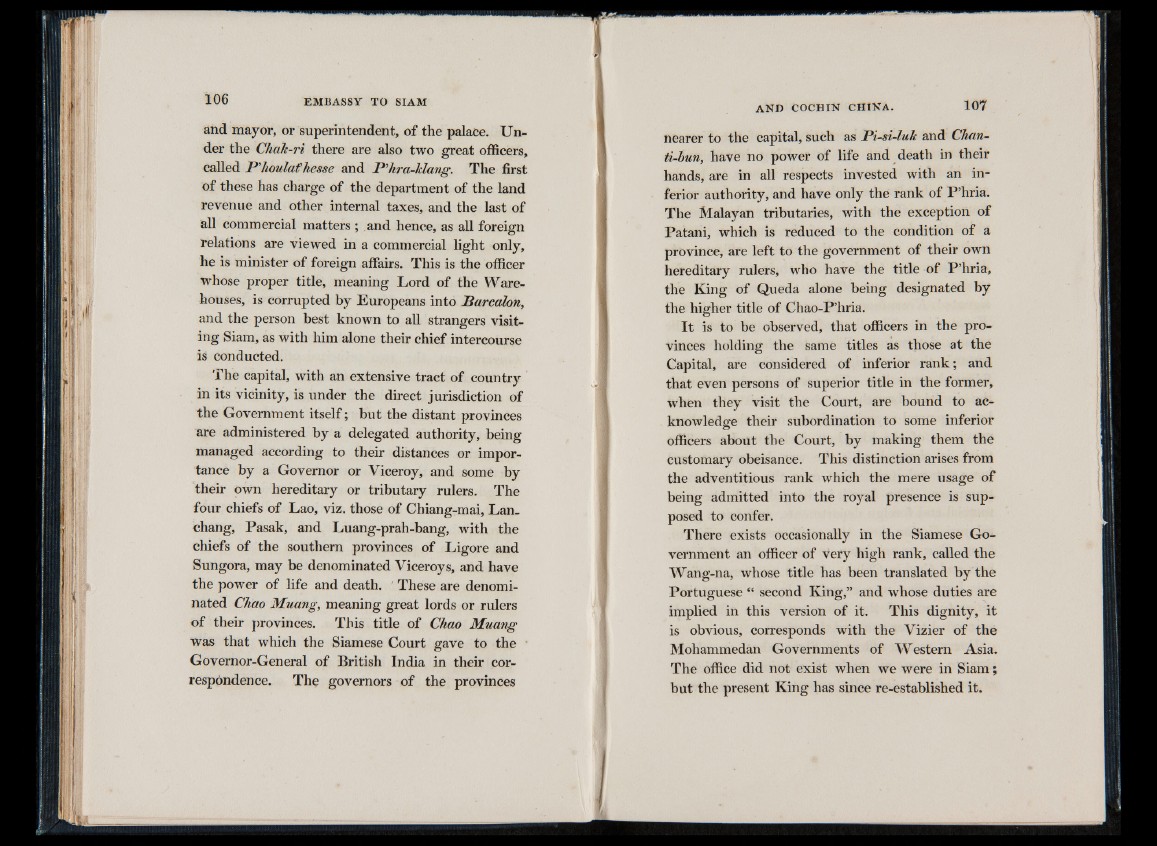
and mayor, or superintendent, of the palaee. Under
the Chah-ri there are also two great officers,
called P ’houlaf hesse and P ’hra-hlang. The first
of these has charge of the department of the land
revenue and other internal taxes, and the last of
all commercial matters ; and hence, as all foreign
Telations are viewed in a commercial light only,
he is minister of foreign affairs. This is the officer
whose proper title, meaning Lord of the Warehouses,
is corrupted by Europeans into Barcalon,
and the person best known to all strangers visiting
Siam, as with him alone their chief intercourse
is conducted.
The capital, with an extensive tract of country
in its vicinity, is under the direct jurisdiction of
the Government itself; but the distant provinces
are administered by a delegated authority, being
managed according to their distances or importance
by a Governor or Viceroy, and some by
their own hereditary or tributary rulers. The
four chiefs of Lao, viz. those of Ghiang-mai, Lan_
chang, Pasak, and Luang-prah-bang, with the
chiefs of the southern provinces of Ligore and
Sungora, may be denominated Viceroys, and have
the power of life and death. These are denominated
Chao Muang, meaning great lords or rulers
of their provinces. This title of Chao Muang
was that which the Siamese Court gave to the
Governor-General of British India in their correspondence.
The governors of the provinces
nearer to the capital, such as Pi-si-luk and Chan-
ti-bun, have no power of life and death in their
hands, are in all respects invested with an inferior
authority, and have only the rank of P ’hria.
The Malayan tributaries, with the exception of
Patani, which is reduced to the condition of a
province, are left to the government of their own
hereditary rulers, who have the title of P ’hria,
the King of Queda alone being designated by
the higher title of Chao-P’hria.
I t is to be observed, that officers in the provinces
holding the same titles as those at the
Capital, are considered of inferior ra n k ; and
that even persons of superior title in the former,
when they visit the Court, are bound to acknowledge
their subordination to some inferior
officers about the Court, by making them the
customary obeisance. This distinction arises from
the adventitious rank which the mere usage of
being admitted into the royal presence is supposed
to confer.
There exists occasionally in the Siamese Government
an officer of very high rank, called the
Wang-na, whose title has been translated by the
Portuguese ** second King,” and whose duties are
implied in this version of it. This dignity, it
is obvious, corresponds with the Vizier of the
Mohammedan Governments of Western Asia.
The office did not exist when we were in Siam;
but the present King has since re-established it.